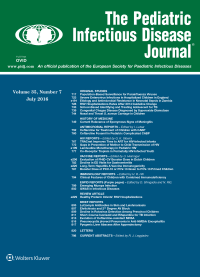
Late-onset Sepsis in Extremely Premature Infants
Background:
Late-onset sepsis (LOS) is an important cause of death and neurodevelopmental impairment in premature infants. The purpose of this study was to assess overall incidence of LOS, distribution of LOS-causative organisms and center variation in incidence of LOS for extremely premature infants over time.
Methods:
In a retrospective analysis of infants 401–1000 g birth weight and 22–28 6/7 weeks of gestational age born at 12 National Institute of Child Health and Human Development Neonatal Research Network centers in the years 2000–2005 (era 1) or 2006–2011 (era 2) who survived >72 hours, we compared the incidence of LOS and pathogen distribution in the 2 eras using the χ2 test. We also examined the effect of birth year on the incidence of LOS using multivariable regression to adjust for nonmodifiable risk factors and for center. To assess whether the incidence of LOS was different among centers in era 2, we used a multivariable regression model to adjust for nonmodifiable risk factors.
Results:
Ten-thousand one-hundred thirty-one infants were studied. LOS occurred in 2083 of 5031 (41%) infants in era 1 and 1728 of 5100 (34%) infants in era 2 (P < 0.001). Birth year was a significant predictor of LOS on adjusted analysis, with birth years 2000–2009 having a significantly higher odds of LOS than the reference year 2011. Pathogens did not differ, with the exception of decreased fungal infection (P < 0.001). In era 2, 9 centers had significantly higher odds of LOS compared with the center with the lowest incidence.
Conclusions:
The incidence of LOS decreased over time. Further investigation is warranted to determine which interventions have the greatest impact on infection rates.
Late-onset sepsis (LOS) is an important cause of death and neurodevelopmental impairment in premature infants. The purpose of this study was to assess overall incidence of LOS, distribution of LOS-causative organisms and center variation in incidence of LOS for extremely premature infants over time.
Methods:
In a retrospective analysis of infants 401–1000 g birth weight and 22–28 6/7 weeks of gestational age born at 12 National Institute of Child Health and Human Development Neonatal Research Network centers in the years 2000–2005 (era 1) or 2006–2011 (era 2) who survived >72 hours, we compared the incidence of LOS and pathogen distribution in the 2 eras using the χ2 test. We also examined the effect of birth year on the incidence of LOS using multivariable regression to adjust for nonmodifiable risk factors and for center. To assess whether the incidence of LOS was different among centers in era 2, we used a multivariable regression model to adjust for nonmodifiable risk factors.
Results:
Ten-thousand one-hundred thirty-one infants were studied. LOS occurred in 2083 of 5031 (41%) infants in era 1 and 1728 of 5100 (34%) infants in era 2 (P < 0.001). Birth year was a significant predictor of LOS on adjusted analysis, with birth years 2000–2009 having a significantly higher odds of LOS than the reference year 2011. Pathogens did not differ, with the exception of decreased fungal infection (P < 0.001). In era 2, 9 centers had significantly higher odds of LOS compared with the center with the lowest incidence.
Conclusions:
The incidence of LOS decreased over time. Further investigation is warranted to determine which interventions have the greatest impact on infection rates.
Keywords: extremely premature infants; late-onset sepsis; neonatal intensive care unit
Document Type: Research Article
Publication date: 01 August 2017
- Access Key
- Free content
- Partial Free content
- New content
- Open access content
- Partial Open access content
- Subscribed content
- Partial Subscribed content
- Free trial content